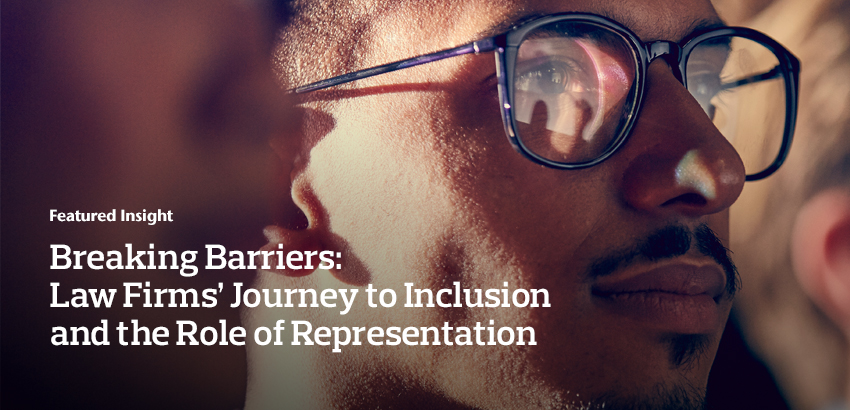Aon | Professional Services Practice
Breaking Barriers: Law Firms’ Journey to Inclusion and The Role of Representation
Release Date: February 2022 
Jared Bartie, a nationally recognized sports attorney and chair of the Sports Transactions Practice at Willkie Farr & Gallagher LLP, shares his experiences of diversity, equity and inclusion in the workplace and discusses the value of representation.
Tell us about your background and your journey to become a lawyer.
I grew up in Cambridge, Massachusetts and I was raised by my mother and my grandparents. My grandfather was a superintendent at a dormitory at Harvard and both my grandparents lived on campus for the better part of 20 years. Living out a good part of my childhood at Harvard gave me a different lens into university life and opened my eyes to new possibilities at an early age. My mother was a secretary at MIT (Massachusetts Institute of Technology), working in the Office of Minority Affairs, affording me a perspective into what we now refer to as diversity, equity and inclusion (DE&I) from a young age.
My grandparents grew up in the segregated South without equal access to education. Throughout my childhood, my grandparents and my mother removed obstacles to help me succeed. As a result of their efforts, I was the first in my family to go to college and then to law school.
Throughout your education and early career, did you have mentors, and do you think mentors are important?
I played competitive basketball in high school, and I was recruited by several small schools to play college ball, but I didn’t want basketball to be my sole entry point to college. American University offered me a full tuition scholarship – the Frederick Douglass Scholarship – which is primarily for diverse first-generation students. During this time, I was introduced to the first lawyer I had ever met, and he happens to be Black. He was also the head coach of the basketball team. For the first time, I saw these two worlds come together in a way that I had never considered. He was, and continues to be, an inspiration. He shared his own career journey, giving me an understanding of how I could follow his path or forge my own. This came at a crucial point in my life. At the time, I was considering different career paths, but he was a role model who opened my eyes to new possibilities in the legal and sports sectors. His mentorship has been invaluable.
I went on to Northwestern Law School, with a generous offer of financial support from the Law School. With three years of tuition fees covered, I was able to study at a school that otherwise would have been out of my reach. I signed unseen. I bought a one-way ticket, got out of the taxi on the wrong side of campus and made my way from there.
During my early days at Northwestern Law School, I was fortunate to meet an upperclassman who took me under his wing. The law school experience was foreign to me. He became an integral part of my support system. From offering me a loan until my financial aid arrived, to regularly letting me use his computer to ensure my assignments were completed in timely fashion, his support was critical to my indoctrination to law school.
I have been privileged to have had a number of people committed to helping me along the way. I’m in the position where I am able to do the same for others. I have advised and mentored many students and lawyers in their early careers and try to never forget the weight a bit of advice and guidance might have on someone else’s growth and success. In my experience, committing to the work is not always enough. You need someone who has walked the path to point out where the hurdles are and to provide guidance on how to navigate the landscape.
Is promoting equal opportunities for diverse students a personal mission for you?
The friend who helped me in law school and I have maintained a friendship for over 30 years and reconnected recently to endow a $250,000 scholarship at Northwestern Law School. The Bartie-Greer Opportunity Scholarship was created to support Law School students who bring distinct experiences to their class, such as notable leadership skills or a history of resilience or achievement while overcoming hardship. We want to give others the chances we were fortunate to have. We want to take this full circle and show future generations the leaders who have gone before them are committed to supporting their success.
I was also one of the founders of the African American History and Culture Endowed Scholarship at Northwestern Law School. Along with a group of African American alumni, we raised substantial funds to enhance the Law School’s efforts to attract and foster a diverse, inclusive and socially engaged academic community.
For everything that Northwestern Law School has afforded me, it is important to me to do my best to give back. Access to education, to Law School and to career opportunities needs to be sustainable, and I’m committed to doing my part.
What should law firms focus on to boost inclusivity?
A focus on culture is critical to creating an environment where people feel as though they are included and belong.
Sometimes the dialogue leads to “uncomfortable conversations.” I can appreciate how sensitive topics can be uncomfortable, but, for me, discussions on DE&I topics are not uncomfortable. Respect is the hallmark of an inclusive firm. Tackling sensitive topics and encouraging honest conversations builds the pathway to creating an inclusive culture that appreciates and values differences in thoughts, perspectives and experiences.

